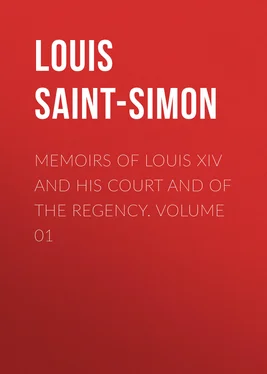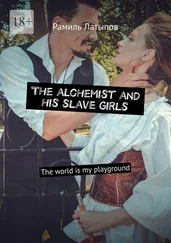Louis Saint-Simon - Memoirs of Louis XIV and His Court and of the Regency. Volume 01
Здесь есть возможность читать онлайн «Louis Saint-Simon - Memoirs of Louis XIV and His Court and of the Regency. Volume 01» — ознакомительный отрывок электронной книги совершенно бесплатно, а после прочтения отрывка купить полную версию. В некоторых случаях можно слушать аудио, скачать через торрент в формате fb2 и присутствует краткое содержание. Жанр: Биографии и Мемуары, История, foreign_edu, foreign_antique, foreign_prose, на английском языке. Описание произведения, (предисловие) а так же отзывы посетителей доступны на портале библиотеки ЛибКат.
- Название:Memoirs of Louis XIV and His Court and of the Regency. Volume 01
- Автор:
- Жанр:
- Год:неизвестен
- ISBN:нет данных
- Рейтинг книги:5 / 5. Голосов: 1
-
Избранное:Добавить в избранное
- Отзывы:
-
Ваша оценка:
- 100
- 1
- 2
- 3
- 4
- 5
Memoirs of Louis XIV and His Court and of the Regency. Volume 01: краткое содержание, описание и аннотация
Предлагаем к чтению аннотацию, описание, краткое содержание или предисловие (зависит от того, что написал сам автор книги «Memoirs of Louis XIV and His Court and of the Regency. Volume 01»). Если вы не нашли необходимую информацию о книге — напишите в комментариях, мы постараемся отыскать её.
Memoirs of Louis XIV and His Court and of the Regency. Volume 01 — читать онлайн ознакомительный отрывок
Ниже представлен текст книги, разбитый по страницам. Система сохранения места последней прочитанной страницы, позволяет с удобством читать онлайн бесплатно книгу «Memoirs of Louis XIV and His Court and of the Regency. Volume 01», без необходимости каждый раз заново искать на чём Вы остановились. Поставьте закладку, и сможете в любой момент перейти на страницу, на которой закончили чтение.
Интервал:
Закладка:
But I must go back a little, and speak of two marriages that took place at the commencement of this year the first (most extraordinary) on the 18th February the other a month after.
CHAPTER II
The King was very anxious to establish his illegitimate children, whom he advanced day by day; and had married two of them, daughters, to Princes of the blood. One of these, the Princesse de Conti, only daughter of the King and Madame de la Valliere, was a widow without children; the other, eldest daughter of the King and Madame de Montespan, had married Monsieur le Duc (Louis de Bourbon, eldest son of the Prince de Conde). For some time past Madame de Maintenon, even more than the King, had thought of nothing else than how to raise the remaining illegitimate children, and wished to marry Mademoiselle de Blois (second daughter of the King and of Madame de Montespan) to Monsieur the Duc de Chartres. The Duc de Chartres was the sole nephew of the King, and was much above the Princes of the blood by his rank of Grandson of France, and by the Court that Monsieur his father kept up.
The marriages of the two Princes of the blood, of which I have just spoken, had scandalised all the world. The King was not ignorant of this; and he could thus judge of the effect of a marriage even more startling; such as was this proposed one. But for four years he had turned it over in his mind and had even taken the first steps to bring it about. It was the more difficult because the father of the Duc de Chartres was infinitely proud of his rank, and the mother belonged to a nation which abhorred illegitimacy and, misalliances, and was indeed of a character to forbid all hope of her ever relishing this marriage.
In order to vanquish all these obstacles, the King applied to M. le Grand (Louis de Lorraine). This person was brother of the Chevalier de Lorraine, the favourite, by disgraceful means, of Monsieur, father of the Duc de Chartres. The two brothers, unscrupulous and corrupt, entered willingly into the scheme, but demanded as a reward, paid in advance, to be made "Chevaliers of the Order." This was done, although somewhat against the inclination of the King, and success was promised.
The young Duc de Chartres had at that time for teacher Dubois (afterwards the famous Cardinal Dubois), whose history was singular. He had formerly been a valet; but displaying unusual aptitude for learning, had been instructed by his master in literature and history, and in due time passed into the service of Saint Laurent, who was the Duc de Chartres' first instructor. He became so useful and showed so much skill, that Saint Laurent made him become an abbe. Thus raised in position, he passed much time with the Duc de Chartres, assisting him to prepare his lessons, to write his exercises, and to look out words in the dictionary. I have seen him thus engaged over and over again, when I used to go and play with the Duc de Chartres. As Saint Laurent grew infirm, Dubois little by little supplied his place; supplied it well too, and yet pleased the young Duke. When Saint Laurent died Dubois aspired to succeed him. He had paid his court to the Chevalier de Lorraine, by whose influence he was much aided in obtaining his wish. When at last appointed successor to Saint Laurent, I never saw a man so glad, nor with more reason. The extreme obligation he was under to the Chevalier de Lorraine, and still more the difficulty of maintaining himself in his new position, attached him more and more to his protector.
It was, then, Dubois that the Chevalier de Lorraine made use of to gain the consent of the young Duc de Chartres to the marriage proposed by the King. Dubois had, in fact, gained the Duke's confidence, which it was easy to do at that age; had made him afraid of his father and of the King; and, on the other hand, had filled him with fine hopes and expectations. All that Dubois could do, however, when he broke the matter of the marriage to the young Duke, was to ward off a direct refusal; but that was sufficient for the success of the enterprise. Monsieur was already gained, and as soon as the King had a reply from Dubois he hastened to broach the affair. A day or two before this, however, Madame (mother of the Duc de Chartres) had scent of what was going on. She spoke to her son of the indignity of this marriage with that force in which she was never wanting, and drew from him a promise that he would not consent to it. Thus, he was feeble towards his teacher, feeble towards his mother, and there was aversion on the one hand and fear on the other, and great embarrassment on all sides.
One day early after dinner I saw M. de Chartres, with a very sad air, come out of his apartment and enter the closet of the King. He found his Majesty alone with Monsieur. The King spoke very obligingly to the Duc de Chartres, said that he wished to see him married; that he offered him his daughter, but that he did not intend to constrain him in the matter, but left him quite at liberty. This discourse, however, pronounced with that terrifying majesty so natural to the King, and addressed to a timid young prince, took away his voice, and quite unnerved him. He, thought to escape from his slippery position by throwing himself upon Monsieur and Madame, and stammeringly replied that the King was master, but that a son's will depended upon that of his parents. "What you say is very proper," replied the King; "but as soon as you consent to my proposition your father and mother will not oppose it." And then turning to Monsieur he said, "Is this not true, my brother? "Monsieur consented, as he had already done, and the only person remaining to consult was Madame, who was immediately sent for.
As soon as she came, the King, making her acquainted with his project, said that he reckoned she would not oppose what her husband and her son had already agreed to. Madame, who had counted upon the refusal of her son, was tongue-tied. She threw two furious glances upon Monsieur and upon the Duc de Chartres, and then said that, as they wished it, she had nothing to say, made a slight reverence, and went away. Her son immediately followed her to explain his conduct; but railing against him, with tears in her eyes, she would not listen, and drove him from her room. Her husband, who shortly afterwards joined her, met with almost the same treatment.
That evening an "Apartment" was held at the palace, as was customary three times a week during the winter; the other three evenings being set apart for comedy, and the Sunday being free. An Apartment as it was called, was an assemblage of all the Court in the grand saloon, from seven o'clock in the evening until ten, when the King sat down to table; and, after ten, in one of the saloons at the end of the grand gallery towards the tribune of the chapel. In the first place there was some music; then tables were placed all about for all kinds of gambling; there was a 'lansquenet'; at which Monsieur and Monseigneur always played; also a billiard-table; in a word, every one was free to play with every one, and allowed to ask for fresh tables as all the others were occupied. Beyond the billiards was a refreshment-room. All was perfectly lighted. At the outset, the King went to the "apartments" very often and played, but lately he had ceased to do so. He spent the evening with Madame de Maintenon, working with different ministers one after the other. But still he wished his courtiers to attend assiduously.
This evening, directly after the music had finished, the King sent for Monseigneur and Monsieur, who were already playing at 'lansquenet'; Madame, who scarcely looked at a, party of 'hombre' at which she had seated herself; the Duc de Chartres, who, with a rueful visage, was playing at chess; and Mademoiselle de Blois, who had scarcely begun to appear in society, but who this evening was extraordinarily decked out, and who, as yet, knew nothing and suspected nothing; and therefore, being naturally very timid, and horribly afraid of the King, believed herself sent for in order to be reprimanded, and trembled so that Madame de Maintenon took her upon her knees, where she held her, but was scarcely able to reassure her. The fact of these royal persons being sent for by the King at once made people think that a marriage was in contemplation. In a few minutes they returned, and then the announcement was made public. I arrived at that moment. I found everybody m clusters, and great astonishment expressed upon every face. Madame was walking in the gallery with Chateauthiers—her favourite, and worthy of being so. She took long strides, her handkerchief in her hand, weeping without constraint, speaking pretty loudly, gesticulating; and looking like Ceres after the rape of her daughter Proserpine, seeking her in fury, and demanding her back from Jupiter. Every one respectfully made way to let her pass. Monsieur, who had returned to 'lansquenet', seemed overwhelmed with shame, and his son appeared in despair; and the bride-elect was marvellously embarrassed and sad. Though very young, and likely to be dazzled by such a marriage, she understood what was passing, and feared the consequences. Most people appeared full of consternation.
Читать дальшеИнтервал:
Закладка:
Похожие книги на «Memoirs of Louis XIV and His Court and of the Regency. Volume 01»
Представляем Вашему вниманию похожие книги на «Memoirs of Louis XIV and His Court and of the Regency. Volume 01» списком для выбора. Мы отобрали схожую по названию и смыслу литературу в надежде предоставить читателям больше вариантов отыскать новые, интересные, ещё непрочитанные произведения.
Обсуждение, отзывы о книге «Memoirs of Louis XIV and His Court and of the Regency. Volume 01» и просто собственные мнения читателей. Оставьте ваши комментарии, напишите, что Вы думаете о произведении, его смысле или главных героях. Укажите что конкретно понравилось, а что нет, и почему Вы так считаете.












